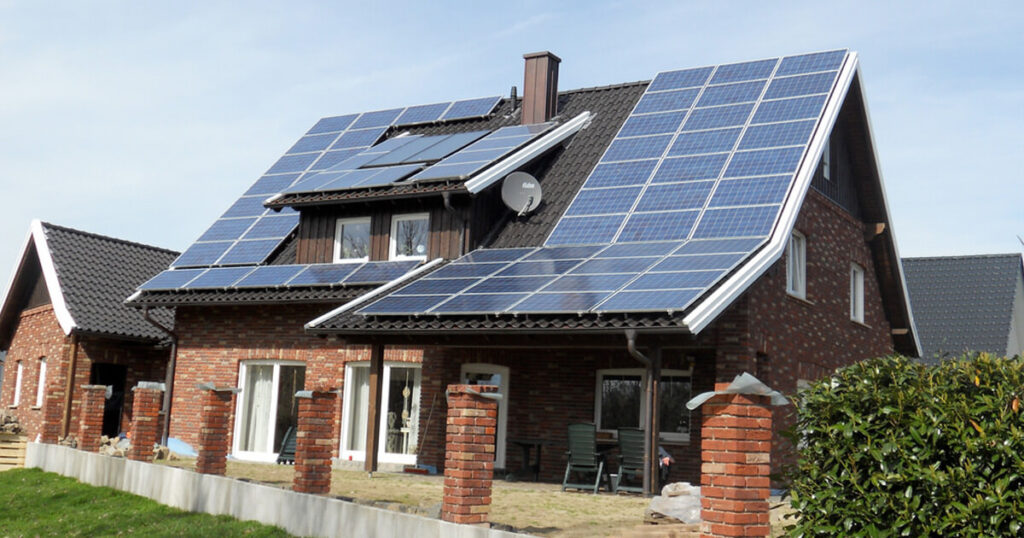Assessing Energy Needs
To pick the right solar panel size, check your old electricity bills to understand your energy use. Consider your home’s location, roof space, and any shady areas. Tracking your energy use helps decide if solar panels are a good fit. If you use more power during sunny times, solar can cut costs by using sunlight instead of regular electricity.
To make solar power work better, first reduce your energy use by getting efficient appliances, improving insulation, and using smart thermostats.
Solar System Sizing
Getting the right size solar system is crucial for efficient and affordable energy. It involves calculating your power usage and selecting the appropriate number of solar panels and batteries. This ensures you save money, reduce waste, and have sufficient power.
Determine Panel Requirements
To figure out how many solar panels you need, first check how much energy your home uses. The efficiency and wattage of the solar panels are important because higher wattage means more power from fewer panels. Also, think about if you’ll use more energy later to avoid adding more panels in the future.
Assess Roof Space
The size and design of your roof decide how many solar panels fit. Measure your space well for installing them. Your roof should ideally face south and have a 15 to 40-degree tilt for the best sun exposure. Watch out for any shade from trees or buildings, as it can lower your solar energy output.
Evaluate Efficiency Ratings
When picking solar panels, look at their efficiency ratings. The ones with high efficiency make more electricity in less space, perfect for small roofs, but they’re pricier. Also, check how fast they lose efficiency over time because some brands last longer than others. Go for high-quality panels to keep your solar power strong for a longer time.
Energy Storage Solutions
Solar batteries, especially lithium-ion, store sunlight for nighttime or cloudy day use, making solar power reliable. Though pricey, they offer long-term savings and enhanced performance. Adding a gas or propane backup generator ensures power during low sunlight or emergencies, is suitable for various homes. Solar panels, despite their upfront cost, ultimately save on electricity bills, boost home value, and reduce carbon emissions, making them a cost-effective investment over time.
Seasonal Variations
Solar energy peaks in summer due to longer, stronger sunlight. In winter, solar power drops because of shorter days and a lower sun. However, solar panels perform better in the cooler spring and fall than in the hot summer.
Impact of Weather Changes
Seasonal shifts affect solar panel efficiency. More sunlight in summer boosts energy, while winter’s shorter days decrease it. Clouds and rain can lower power too. If switching to off-grid solar, remember this, especially in cloudy areas. Consider extra panels or a backup power source.
Adjust Energy Consumption
To get the most out of solar power, use high-energy appliances like dishwashers during sunny hours. Using timers helps balance energy use, especially important for living off-grid to manage power well.
Optimize Panel Placement
To get the most out of solar panels, place them where they’ll get lots of sun and make sure nothing blocks them, like trees or buildings. Keep them clean from dust and stuff so they work their best.
Cost Considerations
Solar panels cost more initially due to their price, installation, and permits, but they save you money on electricity bills in the long run and offer tax breaks. They’re low-cost to maintain and a wise choice for the future. Prices vary based on location and house size, so it’s important to shop around. Solar energy reduces your electric bills and is beneficial as energy costs increase.
Despite the upfront expense, you can manage costs with loans, leases, or payment plans, and government incentives can provide additional savings. Ultimately, investing in solar panels is a smart financial move for your home.
Switch To Solar Energy Production Now!
Switching to solar energy is a smart, eco-friendly choice. First, calculate your energy usage, then choose the right solar system size. Decide whether to store energy or connect to the grid. Despite changing seasons and costs, new tech and financial help are making solar more doable. Going solar saves money and supports a greener future. If you’re set to switch, get a pro to find the best solar setup for you. Let’s use the sun’s energy and help our planet.
